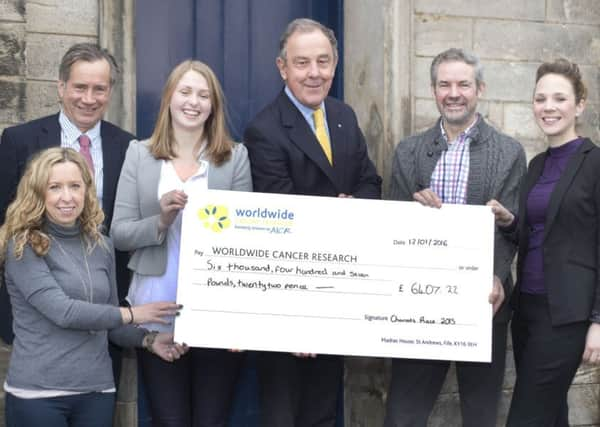Race to sign up for Chariots charity run


Resembling the opening credits of the iconic Chariots of Fire movie scene, filmed on the beachfront, the race will start at 11.30am for the children’s race and midday for the 5km.
The website www.entrycentral.com/chariots opens today (Friday) for participants to register (£15) and take part in a piece of the town’s cinematic past – barefoot, or not!
Advertisement
Hide AdAdvertisement
Hide AdThe race has gone from strength to strength and despite the poor weather last year over 450 runners competed for what is the definitive Chariots of Fire experience and a great family event.
As well as being a not-to-be-missed Fife event, the Chariots Beach Race raises money for St Andrews charity Worldwide Cancer Research and on Tuesday organisers and sponsors handed over a cheque to the charity for an amazing £6,470.22 raised from last year’s race.
Ben McLeod, event organiser, said: “It’s the experience as much as the result that counts. Anyone can go for a half hour run, but it’s not every day that you get the chance to run all in white, with crowd support, the Vangelis theme playing and the promise of a fudge doughnut, ice cream or local beer as a reward!”
All prizes and goodies at the event are generously supplied by the local community and this year, the committee is hoping to beat last year’s target with Worldwide Cancer Research, once again the main charity beneficiary.
Advertisement
Hide AdAdvertisement
Hide AdThe race, born out of Ben’s desire to raise money for a cancer charity following the sad loss of his aunt to the disease in 2002, has grown in popularity over the years.
“It is designed first and foremost to be fun and welcoming but it caters to anyone from beginners to seasoned pros – the beach is big enough for anyone!”
Worldwide Cancer Research is the only UK-based charity that funds early-stage research into any cancer type at some of the world’s top research institutions.
In its 35 year history it has awarded over £192 million in research grants. Findings from Worldwide Cancer Research contribute to advances in diagnosis and treatment across a wide range of cancer types.
Advertisement
Hide AdAdvertisement
Hide AdSally Burton-Graham, director of fundraising said: “Worldwide Cancer Research does not receive any government grants and relies on the generous support of individuals.
“A typical three year cancer research projects costs just over £194,000 so events such as the Chariots Beach Race are crucial.
“We are so grateful for the work of the Chariots’ committee and the local people and businesses who come along and support the race.
“I’m sure this year’s race will be even bigger and better. Fingers crossed for the weather!”
Advertisement
Hide AdAdvertisement
Hide AdOne of the most important contributions Worldwide Cancer Research funded scientists have made is in the understanding of the role of the gene p53, one of the most important genes in cancer biology. Thirty years later, p53 genetic tests are available and can identify families at very high risk. Having a faulty p53 gene increases a person’s chance of developing cancer and makes some cancers much more aggressive. Scientists are developing sophisticated drugs to correct this and some of this latest research is being funded by Worldwide Cancer Research.